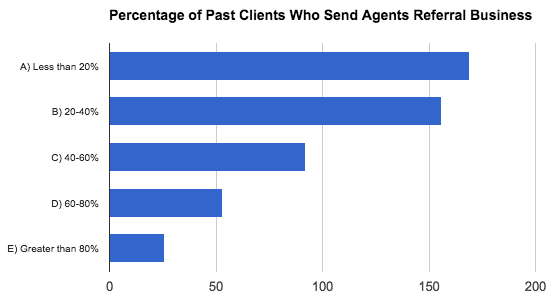At the end of 2014, we challenged agents who read our blog to show us how much they know about real estate agent marketing. Specifically, we gave them a quiz with specific scenarios to see how much money they might be leaving on the table.
This quiz hit close to home too because we had more than 500 people complete the quiz. You guys knew a lot about real estate agent marketing individually, but barely passed the quiz collectively. We set the bar to pass the quiz at 60 percent and overall, the participants scored an average of 66 percent.
Key Finding
While research was not the original intention behind this quiz, one of the most compelling results came from the unscored demographics questions we asked at the end.
Specifically, we asked the question: Of your past clients, what percentage sends you referral business?
What we learned is that the majority of agents are getting less than 20 percent of their past clients to send them leads. Meaning that there is huge untapped potential in your database of past clients to boost your word-of-mouth and referral business.

Quiz Results
Let’s dive into the quiz and discuss the answers and reasoning behind the correct answers. More importantly, see how you stack up compared to other agents out there.
1) How often do you turn away new opportunities?
I can’t take on new clients. I would turn someone down if they walked through my door
I welcome anyone’s business, no matter how busy I am.
Average Score: 94%
Answer’s Logic: Even if you have too much business on your plate, you can still get credit for referring a buyer to another agent. You also get to add the new lead to your contact list, and you build up your agent network, which can help you down the road.
94 percent of the real estate agents taking this quiz got this question right. What the other 6 percent of agents are thinking is beyond me, but you should never turn down business opportunities.
2) Which of these is more expensive?
Acquiring new business.
Retaining existing customers.
Average Score: 72%
Answer’s Logic: It costs 6 to 7 times more to acquire a new customer than it does to retain an existing one.
While investing in your business is important to get your name out there, just be aware that it’s considerably less expensive (and far more lucrative) to market your business to your past customers. This is especially true for real estate agents. When 75 percent of your business comes from referrals, it’s in your best interest to stay in touch with your past customers.
72 percent of agents got this question right, which is definitely promising. But like a lot of things we might know to be true, we still might not follow the facts. Focusing on acquiring new customers instead of retaining existing customers to drive referral business is one of the more common marketing mistakes that real estate agents make.
3) After you’ve successfully sold a house, how do you communicate with that client in the future?
I add them to my ongoing marketing program.
I send them birthday and holiday cards.
I call them once a year.
I don’t bother them.
None of the above.
Average Score: 60%
Answer’s Logic: Any communication is better than none; however, if you’re not doing enough of the right things, you could be leaving money on the table. After someone buys a house, the last thing they want is their agent calling and pestering them about real estate.
However, it’s in your interest to continue to be part of their lives through email and social media. By automating this process, you can stay on their radar but in a helpful way through entertaining and engaging content. Sending birthday and holiday cards and calling them are nice touches, but those activities should be done in addition to adding your customers to an automated, ongoing marketing program.
4) What’s the best way to actively encourage past customers to send you referral business?
Provide good service and rely on my customers to do the rest.
Ask for them.
Have a Yelp page.
Provide an incentive.
Nothing.
Average Score: 64%
Answer’s Logic: Referrals account for up to 75 percent of a real estate agent’s business. It’s in an agent’s best interest to capitalize on this by working to get referrals from past customers.
While providing good service is key to convincing someone to share your name with their friends, it’s often not enough. Providing an incentive up front is a big no-no, of course. However, a thank you after the fact works. And while having a Yelp page is great for future business, it is an indirect way to get referrals from past customers.
That’s why it never hurts to ask. The worst they can say is no (or ignore you).
5) What is the most effective way to drive engagement on your Facebook page?
Dog pictures.
Political memes.
New home listings.
What is Facebook?
Average Score: 13%
Answer’s Logic: This question was the one on the quiz that lowered the average score across the board for all of the agents who took it. Only 13 percent of agents got that, from the options we gave them, dog pictures would be the best answer.
The important thing to remember here is that not everyone who has liked your Facebook page is going to be in the market for a new home, so sharing all of your new listings can get repetitive and boring.
Politics are a sensitive topic on Facebook too. While the majority of your audience might share the same political views as you, you don’t want to risk alienating your customers who don’t.
Funny pictures of dogs on different days of the week, your dog at the office or even funny videos of dogs are a great way to liven up your Facebook page, drive “Likes” and add some personality to your brand.
This is a great lesson that all agents can use for their own pages. Remember, people get onto Facebook to be entertained and while dog pictures are just one example of a strategy to entertain people, there are plenty of other things you can post too. Just remember that you’re focused on reaching a broad audience with the goal of getting them to engage with your posts (Likes and comments).
6) What is the optimal frequency when emailing your past and present contacts?
Every year on their birthday.
Only when they reach out to me.
Only after they sign up for my newsletter.
Consistently (every few weeks).
Never.
Average Score: 80%
Answer’s Logic: According to the National Association of Realtors 2014 agent survey, 88 percent of people would use the same real estate agent again. In fact, agents lose 20 percent of their customers annually due to attrition. The most common reason is that the agent failed to stay in touch.
With email, you can easily stay in touch with your past customers so that your name is easily recalled when they need to contact you. The optimal email sending frequency is generally one to four emails a month.
7) What kind of content should you send to your past clients who aren’t buying/selling a home right now?
Home listings.
Industry information and stats.
I’m a recipe realtor.
Interesting and relevant information for homeowners.
Average Score: 81%
Answer’s Logic: At any given time, the majority of your contact list is made up of people who are not actively looking to buy or sell a home. So sending them new home listings and industry stats is information they will likely ignore, assuming they open the email at all.
Email is the best way to stay in touch regularly with all of your past clients, but the approach to your content marketing needs to be focused on their needs. Good real estate newsletters are rich with substance and written to engage and entertain, not sell.
Recap and Takeaways
Overall, the agents taking the quiz did quite well with most of the questions. However, the question about Facebook is the one that really drove down the overall average score for the group.
Here are the takeaways from this quiz that you should remember:
- It’s always more expensive to acquire new business than it is to retain existing clients.
- Automated marketing programs are the easiest way to stay in front of past clients, which helps increase your referral business.
- Content that you post to social networks and email to past and present clients should be focused on engaging and entertaining your audience, not selling to them.
- And even though you’re getting referral business, our research shows that you’re only getting leads from 20 percent (or fewer) of your past clients.
Did any of these results strike you as being off, or were most of the answers what you expected? Let us know in the comments below!



![Better Email Etiquette Equals Better Marketing Results [16 Rules]](https://www.outboundengine.com/wp-content/uploads/shutterstock_411184843-1-400x250.jpg)

